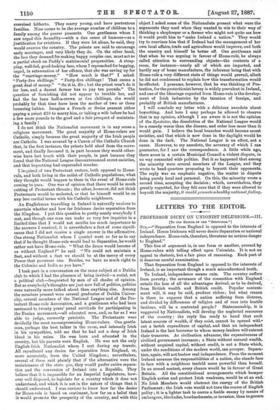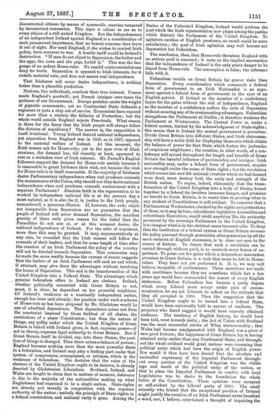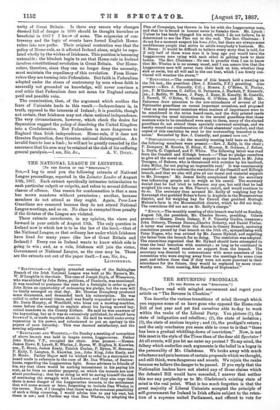LETTERS TO THE EDITOR.
PROFESSOR DICEY ON UNIONIST DELUSIONS.—III. go Tan Emma on IRO ..SPiCTAT013."3 Sin,—" Separation from England is opposed to the interests of Ireland. Hence Irishmen will never desire Separation or national independence. Home-rule, therefore, threatens no serious danger to England."
This line of argument is, in one form or another, pressed by Home-rulers with telling effect upon Unionists. It is not an appeal to rhetoric, but a fair piece of reasoning. Each part of it deserves careful examination.
That Separation from England is opposed to the interests of Ireland, is an important though a much misunderstood truth.
To Ireland, independence means ruin. The country suffers from poverty ; the severance of the connection with England entails the loss of all the advantages derived, or to be derived, from British wealth and British credit. Popular content- ment will, it may be said, produce riches ; but what reason is there to suppose that a nation suffering from distress, and divided by differences of religion and of race into hostile factions, will be a contented people ? Statesmanship, it is suggested by Nationalists, will develop the neglected resources of the country ; the reply lies ready to hand that such latent sources of wealth, if they exist, cannot be opened with out a lavish expenditure of capital, and that an independent Ireland is the last borrower to whom money-lenders will entrust their treasures. As civilisation advances, the expensiveness of civilised government increases ; a State without natural wealth, without acquired capital, without credit, is not a State which, under the conditions of the modern world, can prosper. Separa- tion, again, will not bestow real independence. From the moment Ireland assumes the responsibilities of a nation, she stands face to face with a neighbour tenfold more powerful than herself. In an armed contest, every chance would be in favour of Great Britain. All the constitutional arrangements which hamper English action and protect Irish weakness, would be at an end. No Irish Members would obstruct the energy of the British Parliament ; the Irish vote would not turn the course of English policy ; it is a lighter task to coerce a feeble enemy by means of embargoes, blockades, bombardments, or invasion, than to govern -discontented citizens by means of spasmodic coercion tempered by inconsistent concession. This topic is odious to me as to every citizen of a still united Kingdom. But the defencelessness of an independent Ireland against England is a consideration of snob paramount importance, that no honest reasoner dare leave it out of sight. Nor need England, if she wishes to control Irish policy, have recourse to war. A hostile tariff would be Ireland's destruction. " If men do not object to Separation, the butter and the eggs, the cows and the pigs, forbid it." This was the lan- guage of an ardent Home-ruler. No candid controversialist can deny its truth. Separation is opposed to Irish interests, for it entails material ruin, and does not ensure real independence.
That Irishmen will never desire independence, is nothing better than a plausible prediction.
Nations, like individuals, overlook their true interest. France needs England's goodwill ; yet French intrigue over-taxes the patience of our Government. Europe perishes under the weight of gigantic armaments ; yet no Continental State disbands a regiment or puts a ship out of service. Economists have exposed for more than a century the fallacies of Protection ; but the whole world outside England rejects Free-trade. What reason is there for the fancy that the Irish people will always follow the dictates of expediency P The answer is, the supposition is itself irrational. Young Ireland desired national independence, yet separation from England was in 1848, as in 1887, opposed to the material welfare of Ireland. At this moment, the Irish masses ask for Home-rule; yet in the eyes even of Glad- atonians, the demand has, till recently at least, appeared to rest on a mistaken view of Irish interest. Mr. Parnell's English followers support the demand for Home-rule mainly because it is reasonable to grant Irishmen their wish, not because the wish for Home-rule is in itself reasonable. If the majority of Irishmen desire Parliamentary independence when cool prudence counsels the maintenance of theUnion, why should not they desire national independence when cool prudence counsels contentment with a separate Parliament P Absolute faith in the regeneration to be worked by independent national life is at the present day a most natural, as it is also (be it, in justice to the Irish people, remembered) a generous illusion. If, however, the evils which are inseparable from Separation are no guarantee that the people of Ireland will never demand Separation, the manifest gravity of these evils gives reason for the belief that the Parnellitee do not aim at, or at this moment desire, the national independence of Ireland. For the sake of argument, more than this may be granted. It may, argumentatively at any rate, be conceded that the Irish masses will follow the counsels of their leaders, and that for some length of time after the creation of an Irish Parliament the policy of the country will not be directed towards Separation. This concession may be made the more readily because the current of events suggests that the leaders of an Irish Parliament will seek an end which, if attained, may give them the advantages without involving the losses of Separation. This end is the transformation of the United Kingdom into a Federal State. The advantages which • genuine federalism offers to Ireland are obvious. Ireland, whether politically connected with Great Britain or not, must, it is clear, be dependent on her powerful neighbour. Of Ireland's weakness as a nominally independent nation, enough has been said already ; her position under such a scheme of Home-role as has been proposed by Mr. Gladstone would be one of admitted dependence. This dependence arises not from the constraint imposed by those feeblest of all chains, the restrictions of a paper Constitution ; but from the nature of things, any polity under which the United Kingdom of Great Britain is linked with Ireland gives, in fact, supreme power—if not in theory, supreme legal authority to Great Britain. But if Great Britain itself be divided, say, into three States, the posi- tion of things is changed. Then there arises a balance of powers ; England becomes nothing more than the most powerful State in a federation, and Ireland may play a leading part under that system of compromise, arrangement, or intrigue, which is the weakness of federalism. The doctrine that the voice of the electors of the United Kingdom ought to be decisive, is already descried by Gladstonian Liberalism. Scotland, Ireland, and Wales are taught to claim that in matters of moment, deference is due to the majority of the nationalities making up what Englishmen had supposed to be a single nation. State-rights are already put morally in competition with the supreme authority of the nation; embody the principle of State-rights in a federal constitution, and national unity is gone. Among the States of the Federated Kingdom, Ireland would perform the put which the Irish representation now plays among the parties which distract the Parliament of the United Kingdom. To agitators careless of English greatness, no result could be more satisfactory ; the goal of Irish agitation may well become not Separation but Federalism.
The conclusion, then, that Home-rule threatens England with no serious peril is unsound ; it rests on the implied assumption that the independence of Ireland ie the only grave danger to be feared from Home-rule. The assumption is false; the inference falls with it.
Federalism entails on Great Britain far graver risks than Separation. Every consideration which commends a federal form of government to an Irish Nationalist is an argu- ment against a federal form of government in the eyes of an English patriot. If Ireland as the member of a confederacy hopes for the gains without the risk of independence, England as the member of a confederacy suffers the evils of Separation without securing any of its compensating advantages. Federalism strengthens the Parliament at Dublin ; it therefore weakens the Parliament at Westminster. The Central Power is, under a federal system, limited by the acknowledgment of State-rights ; this means that in Ireland the central government is powerless. Divide Great Britain into different States, and Irish statesman- ship will have a noble field for displaying those arts which obtain the balance of power for that State which fosters the jealousies of suspicions neighbours ; the creation, in other words, of a con- federacy will spread throughout the length and breadth of Great Britain the baneful influence of partisanship and intrigue. Irish nationality may, under a federal form of government, acquire new strength under the name of State rights ; but the revolution which rouses into new life national rivalries which we had deemed were dead, must destroy both the unity and strength of the British nation. To argue, indeed, elaborately that the trans- formation of the United Kingdom into a body of States, bound together by a federal tie, involves immense danger, and promises no benefit to Great Britain, is to waste time in proving what to any student of Constitutions is self-evident. To conceive that a Parliament at Westminster, checked by the rights and pretentious of three, or it may be four, subordinate legislative Assemblies and subordinate Executives, would wield anything like the authority possessed by the sovereign Parliament in the United Kingdom, is to imagine what is in the strictest sense inconceivable. To deny that the institution of a federal system in Great Britain reverses the policy pursued through generation after generation by all the most eminent of English statesmen, is to close our eyes to the course of history. To dream that such a revolution can be carried through without peril, is to overlook every lesson of ex- perience. To point out the gains which a stupendous innovation promises to Great Britain, is a task that must be left to Home- rulers. They have not yet performed it. It is, we may well believe, incapable of performance. These assertions are made with confidence because they are assertions which but a few years ago would have commanded the assent of every English statesman. Before Federalism has become a party dogma which every Liberal must accept under pain of excom- munication, let me ask Liberals to reflect on the attitude that they all occupied in 1880. Then the suggestion that the United Kingdom ought to be turned into a federal State, would have been universally held to savour of madness. The projector who dared suggest it would have scarcely obtained audience. The tendency of English history, he would have been told, went towards unity ; the Act of Union with Scotland was the most successful stroke of Whig statesmanship ; that Wales had become amalgamated with England was a piece of rare good fortune ; the happiness of Great Britain lay in having attained unity earlier than any Continental State, and through- out the whole civilised world great nations were assuming that political unity which bad been the origin of English power-
Nor would it then have been denied that the absolute and unrivalled supremacy of the Imperial Parliament through- out every portion of the United Kingdom was the visible sign and result of the political unity of the nation, or that to place the Imperial Parliament in conflict with local Legislatures was to shake to the foundation the whole fabric of the Constitution. These opinions were accepted as self-evident by the Liberal party of 1880. The small
minority who hinted that the exceptional position of Ireland might justify the creation of an Irish Parliament never breathed a word, nor, I believe, entertained a thought of impairing the unity of Great Britain. Is there any reason why changes deemed full of danger in 1880 should be thought harmless or beneficial in 1857 P I know of none. The exigencies of con- troversy and the logic of events have forced English Home- rulers into new paths. Their original contention was that the policy of Home-role, as it affected Ireland alone, might be regu- lated wholly by the wishes of Irishmen. This position is becoming untenable ; the blindest begin to see that Home-rule in Ireland involves constitutional revolution in Great Britain. Our Home- rulers, therefore, since they can no longer deny the necessity, must maintain the expediency of this revolution. From Home- rulers they are turning into Federalists. But faith in Federalism adopted under the stress of controversy by men whose faith is assuredly not grounded on knowledge, will never convince a cool critic that Federalism does not mean for England certain peril and possible ruin.
The examination, then, of the argument which soothes the fears of Unionists leads to this result :—Independence is, in truth, opposed to the interests of Ireland; it is possible, though not certain, that Irishmen may not claim national independence. The very circumstances, however, which check the desire for Separation suggest the policy of dissolving the United Kingdom into a Confederation. But Federalism is more dangerous to England than Irish independence. Home-rule, if it does not threaten Separation, does threaten national disintegration. An invalid fears to lose a limb ; he will not be greatly consoled by the assurance that his arm may be retained at the risk of his suffering general paralyeis.—I am, Sir, &c., A. V. DICEY.




































 Previous page
Previous page